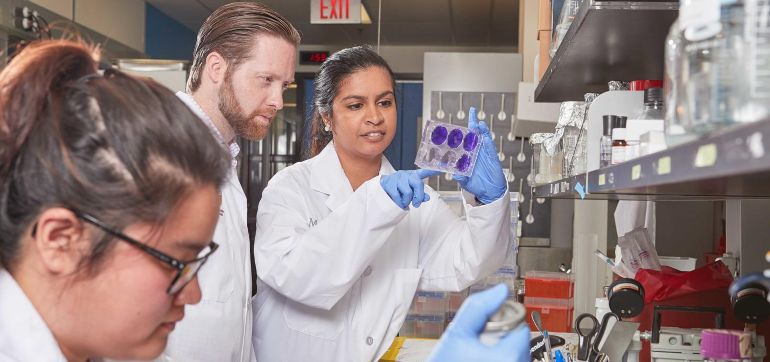
The COVID-19 pandemic brought unprecedented challenges to public health systems worldwide, putting pressure on Canadian health labs. In response, McMaster HealthLabs (MHL) emerged as a crucial player in Canada’s fight against the virus. This non-profit organization, born out of necessity and leveraging the expertise of labs in Hamilton, Ontario, quickly became a leader in COVID-19 research and testing solutions.
Online Gambling: Surprising Lockdown Effect
The pandemic also brought some unexpected consequences, one of which was a significant increase in online gambling. With physical casinos and entertainment venues closed, many people turned to online platforms as a form of distraction and escape during lockdowns. This shift led to a substantial rise in the popularity of the best online casinos, which became a popular choice for home-based entertainment in Canada.
Key factors that drove this surge include:
- Convenience: Players could enjoy games from home, avoiding the need for travel.
- Accessibility: Mobile-friendly apps expanded the reach of online platforms.
- Variety: A wider range of games kept players engaged compared to traditional venues.
- Promotions: Attractive bonuses and rewards enticed both new and returning players.
This surge underscored the need for further research into how isolation and stress during the pandemic affected gaming habits and mental health.
About McMaster HealthLabs
MHL lab was founded in 2020 as a direct response to the COVID-19 crisis. Affiliated with McMaster University, a renowned institution in Hamilton, Ontario, MHL brought together some of the brightest minds in medical research and public health. The organization’s primary focus was to develop and implement research initiatives aimed at curbing the human, economic, and social costs of the pandemic.
Who Was Behind McMaster HealthLabs?

McMaster HealthLabs brought together a diverse team of experts to tackle the challenges posed by the COVID-19 pandemic. The organization’s success was largely due to the collective expertise of its leadership and key researchers.
Leadership Team
- Dr. Jack Gauldie, Chair of the Board
- Dr. Marek Smieja, Scientific Director
- Gail Martin, Strategic Partnerships Director
Key Researchers and Scientists
MHL’s strength came from its roster of accomplished researchers, including:
- Dr. Brian Lichty, Associate Professor of Pathology & Molecular Medicine at McMaster University. Dr. Lichty brought his extensive expertise in using viruses for immunotherapies and vaccination against infectious diseases to the team.
- Dr. Zain Chagla, Associate Professor in the Department of Medicine at McMaster University. As an infectious disease specialist, Dr. Chagla provided valuable insights on COVID-19 testing, disease elimination, and public health interventions. His media interviews and op-eds helped inform the public about the pandemic.
These researchers, along with others from McMaster University, St. Joseph’s Healthcare Hamilton, and various Canadian institutions, formed the backbone of MHL’s scientific endeavours. Their combined expertise in virology, immunology, and public health was crucial in developing and implementing MHL’s innovative approaches to COVID-19 testing and research.
MHL partnered with Air Canada, the Greater Toronto Airports Authority, and various health care and manufacturing organizations to conduct its groundbreaking studies, leveraging both academic knowledge and industry resources to address the pandemic’s challenges effectively.
Mission and Values of MHL
MHL’s mission was clear: to create accessible, easy-to-deploy infectious disease testing models that enable sufficient testing volumes from various populations to drive testing, collection, surveillance research, and strategy. Their core values included scientific rigor, innovation, and a commitment to public health.
Key Initiatives and Programs
MHL’s flagship project was the COVID-19 border study at Toronto Pearson International Airport. This study, conducted in partnership with Air Canada and the Greater Toronto Airports Authority, aimed to explore the effectiveness of various quarantine periods for travellers and assess the feasibility of airport-based COVID-19 surveillance programs.
Studies and Their Results
The Canadian International COVID-19 Surveillance Border Study yielded significant findings:
- Over 20,000 tests were conducted on more than 8,600 participants.
- 99% of study participants tested negative for COVID-19, with only 1% testing positive.
- The majority of positive cases (68.5%) were identified on Day 1 of testing.
These MHL results provided valuable insights into the effectiveness of testing protocols and quarantine measures for international travellers.
Verto Health’s Digital Twin Platform and MHL’s Study
To enhance the effectiveness of their COVID-19 study, MHL partnered with Verto Health to use their digital twin software platform. This partnership supported MHL’s COVID-19 study of international travellers arriving at Toronto Pearson International Airport. Verto Health’s platform enabled the rapid collection and communication of test results, allowing participants to receive their results within 48 hours. The software ensured data privacy and seamless workflow integration, significantly contributing to the study’s success.
How Did the Pandemic Influence Player Behaviour?

The COVID-19 pandemic dramatically altered everyday activities in Ontario, including gambling habits. While McMaster HealthLabs’ (MHL) primary focus was on COVID-19 testing, their research, along with studies from other institutions, shed light on broader behavioural shifts during the pandemic.
With the closure of physical gambling venues in Ontario, many players turned to online platforms. A study conducted by the Responsible Gambling Council (RGC) in collaboration with the Ontario Gambling Research Society (OGRS) provided insights into these changes.
Increased Online Gambling Participation
The RGC study revealed that online gambling participation in Ontario increased significantly during the pandemic. In April 2020, 54% of gamblers reported playing online since the initial lockdown in March. This rose to 87% by December 2020, with participants reporting online gambling in the past three months alone.
Players cited various reasons for increased online gambling:
- Isolation and boredom during lockdowns
- Influence of pervasive advertising
- COVID-19 restrictions (45% of online gamblers in December 2020 reported gambling online due to these restrictions)
Mental Health and Financial Impact on Players
The pandemic’s psychological toll and financial strain contributed to increased gambling as a coping mechanism. The RGC study found that approximately 25% of gamblers reported high levels of anxiety in April 2020, with rates remaining around 20% in follow-up surveys. Depression levels remained stable at about 11% throughout the study period.
Gambling Risk Levels
The study found that while the majority of Ontarian gamblers reported no gambling problems, about 9% screened as high risk for gambling problems in each wave of the survey. Among online gamblers specifically, the prevalence of high-risk gambling doubled from 12% in August 2020 to 24% in December 2020.
Recommendations for Future Regulation
The RGC study highlighted the need for expanded player supports, particularly in light of the upcoming expansion of online gaming in Ontario. Recommendations included:
- Increased player safeguards during COVID-19 and the online gaming market expansion
- Tailored prevention messaging for priority populations
- Increases in the availability and visibility of responsible gambling resources and information, particularly in the online context.
MHL’s Role in Researching Health Behaviours
While MHL’s primary focus was on COVID-19 testing and surveillance, as evidenced by their border study at Toronto Pearson International Airport, their research contributed to a broader understanding of pandemic-driven behaviour changes. This work, along with studies like those conducted by the RGC, helped inform public health policies and interventions across various health domains in Ontario, including the observed rise in online gambling and its associated risks.
How Did MHL Impact Public Health?
MHL’s research had a significant impact on public health policies and practices:
- Influence on Policy Making: The border study results informed decisions about quarantine periods and testing protocols for international travellers.
- Collaboration with Government and Health Organizations: MHL worked closely with Health Canada and the Canadian Institutes of Health Research, receiving $2.5 million in funding to support their border study.
- Public Awareness Campaigns: Through their research and partnerships, MHL helped raise awareness about the importance of COVID-19 testing and surveillance.
McMaster HealthLabs Now
Despite its significant contributions, MHL’s operations were not intended to be permanent. The organization concluded its key projects and closed operations due to:
- Funding and Resource Challenges: As a non-profit formed in response to an immediate crisis, long-term funding was not secured.
- Conclusion of Key Projects: With the completion of the border study and the evolving nature of the pandemic, MHL’s primary objectives were fulfilled.
- Legacy and Future Implications: While MHL is no longer operational, its research continues to inform public health strategies and has set a precedent for rapid, collaborative responses to health crises.
McMaster HealthLabs played a pivotal role in addressing public health challenges during its operation, particularly during the COVID-19 pandemic. Through its research and initiatives, MHL provided valuable insights that continue to influence public health policies and practices across Canada.
The organization’s collaboration with other Canadian health labs enhanced the nation’s testing capacity and research capabilities. Although MHL has closed, its legacy and contributions to public health endure, setting a benchmark for future rapid-response health research initiatives in Hamilton, Ontario, and beyond.
